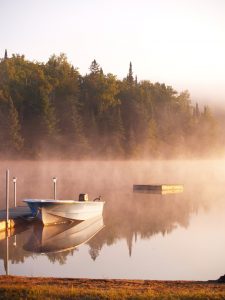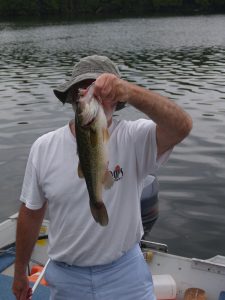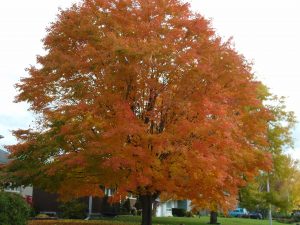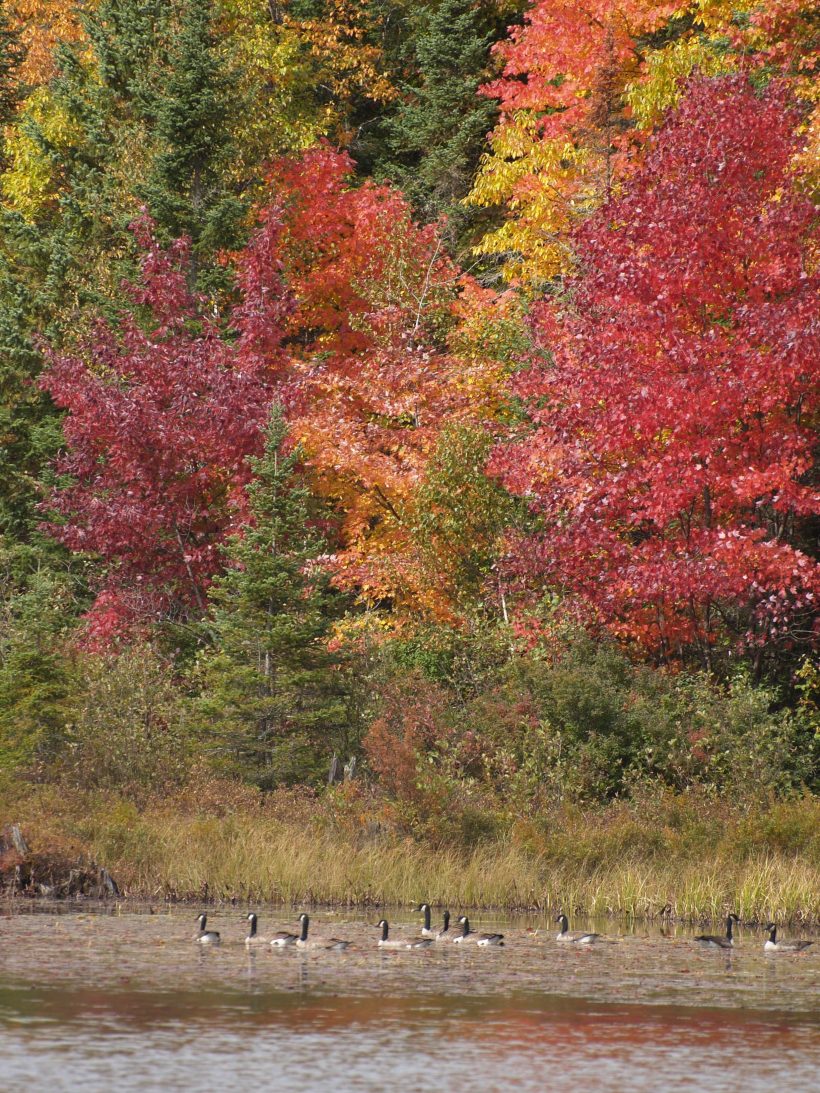WHEN FISHING WAS GOOD and AN INDIAN SUMMER
From October 13, 1976 by Ralph Bice
The fishing season for 1976 has just about ended. The last weekend was not too nice, and a lot of campers made their final trip to the area, but Saturday and Sunday were rather cold and windy for any comfort fishing. And the rain and the wind certainly made a mess of the colour. But that is expected to happen each fall, and soon we will be looking at leafless trees again. So we should be grateful for the presence of evergreens.
But back to fishing. Not so long ago I was with a group of men and as is often the case the subject got around to fishing. Someone told about a marvelous catch he had had many years ago and soon everyone was telling about his favorite fishing trip. Some of these incidents happened years ago but I think it was from gatherings and talks like that where the old saying originated.. “The first liar never did have a chance.” But each one could recall sometime when the fishing had been really good.

So, I got to thinking. It is almost sixty years since I did my first guiding, and over those years I have helped fishermen in taking many fine fish. Some of those catches I will always remember as well as a few times I was not with guests.
Think the first I would recall was the second winter my brother and I spent on the Goulais River above Sault Ste Marie. In the fall when we were building camps we could so easily get a mess of trout, but it was the next spring after the ice was gone that we really could get trout. There was a small rapids perhaps a hundred yards below our camp, and the number of speckled trout you could have caught was amazing. So many times one of us would take the rod, just a long pole with a stout line, a nail for a sinker and not too small hook. The bait was a piece of salt pork, and you got a fish as soon as the line and bait was in the water. The fisherman could be back with fresh fish before the fire was really going. Not big fish, but so many of them. Two winters later I visited trappers on the lake a few miles down stream and they were feeding their dogs on fish and said they could catch fifty in an hour.
The next would be bass. This was the summer of 1923 and the bass fishing, especially on Rain or Rainy as it was called then, the lake I mean, produced many fine catches of bass. This trip on which I had as fishermen three of the really old timers and travelled as far as the park went. We travelled by train then and it would always stop and let us off at the nearest spot on the lake where we would camp. At that time only a few parties fished on Rain Lake. It was mostly the end of a trip or the beginning and not many took the time to fish. Our objective was bass only, and we spent little time on lake trout.

At that time there were many good sized trout being caught in that lake. Our stay was only three days and we could only take back to the hotel the fish caught the last morning as we would be returning to the hotel on the late afternoon train. The limit was eight bass per fisherman and these we had no trouble taking. But it seems that this last morning the larger bass were on the move. We had caught our catch to take well before noon, mostly still fishing, and pictures still show what large fish they were. No one got very excited over a five pound bass then and we had five larger than six pounds. The smallest bass on the string was over four pounds.
I have been paddling the canoe when many lake trout were caught. The largest was one of 28 pounds and it is in the museum in Huntsville. Once I was with a young man and he wanted to travel more than fish, but we were on McGarvey Lake late in the afternoon and we wanted some fish to take home. We could take ten, and these we caught in a little over an hour. But the size. We had one of ten pounds, and I do not think one under seven. I had never seen so many good sized trout caught at one time in that lake. So many times there has been wonderful fishing but that would have to be the time we caught the greatest weight in such a short while.
I was once told by a man who had been a cook in a lumber camp about a fine catch of speckled trout he took at a little lake. Enough to feed a whole crew of lumbermen. I fished the spot he told me about many times with perhaps the odd nice catch but nothing spectacular and far removed from the numbers and size he had taken.
One spring, I think it was 1948; I was on that lake with two young men and decided to try that particular spot. And the fish were there. We got the limit for three of us as fast as we could catch fish. These chaps had never heard of speckled trout over a pound and they broke a lot of leaders. Think the smallest trout was well over two pounds. The odd part is that another party fished that spot the next evening and never got one fish.
Many years ago I was with a party of moose hunters near Sioux Lookout. We were camped on a fairly large lake and there were five hunters and each had a guide. We would leave camp and travel about two miles together until one canoe would stop at some bay or inlet, while the others found other locations. But while together we had a fishing contest. There was a prize for the most fish landed, though only a few were kept. But in the time it takes to paddle two miles one man would often take thirty fish. These were pickerel (walleyes) and pike. Not very large, but so many.
These are the memories that return on those days when you work hard all day and then return with not too many fish.
Indian Summer

Last couple of weeks we have had some really fine weather, and so many times we read where it has been referred to as Indian Summer. Not so. That period of fall comes, not always, after we have had a fall of snow. The name came from the very early settlers. They were amazed at the way many of the native people could predict weather, and some times waited for this last spell of fine weather to finish their fall work, and they referred to it as the “Indians’ Summer”, and the name stuck. Still hope we may have another spell of nice weather but what we have had is not Indian summer.
By the way, in the fall of 1925 I was working in the woods here at Kearney and when we went out to work on the morning of the 13th of October there was ten inches of snow and we still had some of it the following June.
Muskoka Colours
Note one local news column referred to the fall colouring as “Muskoka Colours”. Why? Maybe easier to write than Parry Sound. Funny, I had a bit of a row with a chap who claimed Muskoka was in northern Ontario and now we have a resident of Parry Sound referring to our natural beauty as Muskoka Colours.
